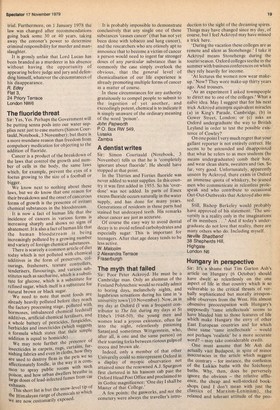The fluoride threat
Sir: Yes, Yes. Perhaps the Government will be putting senna pods into our water supplies next just to ease matters (Simon Courtauld, Notebook , 3 November); but there is a more mundane reason than freedom from compulsory medication for objecting to the addition of fluoride.
Cancer is a product of the breakdown of the laws that control the growth and number of cells in the body, the same laws which, for example, prevent the eyes of a foetus growing to the size of a football or bigger. We know next to nothing about these laws, but we do know that one reason for their breakdown and the onset of cancerous forms of growth is the presence of irritant chemical substances in the bloodstream.
It is now a fact of human life that the incidence of cancers in various forms is increasing sharply and shows no signs of abatement. It is also a fact of human life that the human bloodstream is being increasingly polluted by a growing number and variety of foreign chemical substances. There is scarcely a common article of diet today which is not polluted with chemical additives in the form of preservers, colourings, fresheners, texture controllers, tenderisers, flavourings, and various substitutes such as saccharine, which is a substitute for glucose, which is a substitute for refined sugar, which itself is a substitute for natural brown or black sugar. We need to note that most foods are already heavily polluted before they reach the factory processing stage, polluted with hormones, imbalanced chemical feedstuff additives, artificial chemical fertilisers, and a whole battery of pesticides, fungicides, herbicides and insecticides (which suggests a formula which states that their simple addition is equal to homicide). We may note further the presence of insecticides in carpets, rugs, curtains, furnishing fabrics and even in cloths, how they are used to destroy fleas in the pets we so affectionately fondle, in the way it is corn °n to spray public rooms with such Poison, and how urban dwellers breathe in large doses of lead-infected fumes from car exhausts. This short list is but the snow-level tip of the Himalayan range of chemicals to which we are now customarily exposed. It is probably impossible to demonstrate conclusively that any single one of these substances 'causes cancer' (that has not yet been done with tobacco and lung cancer), and the researchers who are otiosely apt to announce that to become a victim of cancer a person would need to ingest far stronger doses of any particular substance than is commonly the case simply overlook the obvious, that the general level of chemicalisation of our life experience is already promoting multiple forms of cancer as a matter of course.
In these circumstances for any authority gratuitously to compel people to submit to the ingestion of yet another, and exceedingly potent, chemical is to indicate it is simply unaware of the ordinary meaning of the word 'poison'.
John Papworth P.O. Box RW 549, Lusaka Zambia






































 Previous page
Previous page